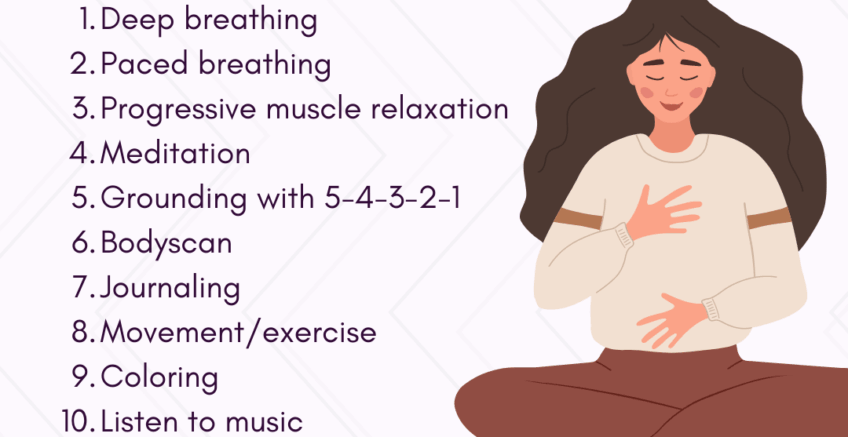Being a teenager can feel like riding a rollercoaster—school pressure, friendships, social media, expectations, and figuring out who you are. For many teens, this rollercoaster comes with some unwanted passengers: anxiety and depression.
If that’s you, first, know this: you’re not alone, and you’re not broken. Feeling overwhelmed doesn’t mean you’re weak—it means you’re human. And while there’s no magic fix, there are real tools that can help. Two of the most powerful? Mindfulness and Acceptance and Commitment Therapy (ACT).
Let’s talk about how they work.
What Is Mindfulness?
Mindfulness is all about being present. Not stuck in the past. Not freaking out about the future. Just here, now.
It means noticing what’s happening inside and around you—your thoughts, feelings, body, and environment—without judging it. You’re not trying to “fix” or “fight” anything. You’re just observing.
🧠 Example:
You’re walking to class and feel your heart racing. Instead of thinking “Why am I freaking out?” or “This is stupid,” you just notice:
“My heart is beating fast. My hands feel sweaty. I’m nervous. And that’s okay.”
It’s not about pretending everything’s fine. It’s about making space for whatever you’re feeling, without getting lost in it.
What Is ACT (Acceptance and Commitment Therapy)?
ACT is a therapy approach that helps you stop battling your thoughts and feelings, and start building a life that feels meaningful—even when things are hard.
There are six core skills in ACT, but you don’t need to memorize them all to start using them. Here’s a quick breakdown:
1. Acceptance
Instead of fighting your feelings (like anxiety, sadness, anger), you learn to let them be there—even if they’re uncomfortable. Feelings aren’t dangerous. They’re just feelings.
👉 Try this:
Next time you’re anxious, try saying:
“Anxiety is here right now. I don’t like it, but I can allow it to be here.”
2. Cognitive Defusion
This means learning to see your thoughts for what they are—just thoughts—not facts or commands.
💭 Example:
Instead of thinking: “I’m a failure,”
you can say: “I’m having the thought that I’m a failure.”
Notice the difference? That little shift gives you space and power.
3. Being Present
This is where mindfulness comes in. Ground yourself in the now. Notice your breath, the sounds around you, how your body feels.
🌱 Try this:
Take 60 seconds to focus only on your breath. In and out. If your mind wanders (which it will), gently bring it back.
4. Self-as-Context
This is a fancy way of saying: you are not your thoughts or feelings. You’re the awareness behind them.
You can feel anxious, and still be you. You can feel sad, and still be okay.
5. Values
ACT helps you figure out what truly matters to you. Kindness? Creativity? Friendship? Honesty?
Even when life is heavy, your values can guide you forward.
✨ Ask yourself:
“What kind of person do I want to be, even on tough days?”
6. Committed Action
This means taking small steps toward your values, even when you’re anxious or sad.
😞 Example:
Feeling down but value connection? Send a text to a friend.
Anxious but value learning? Show up to class, even if it’s hard.
You don’t need to feel “better” before taking action. You can move forward with your feelings.
How to Start Using Mindfulness & ACT Today
You don’t need a therapist (though it helps!). You can begin right now with small steps:
1. Name Your Feelings
Instead of avoiding or judging them, try saying:
“I’m feeling anxious.”
“Sadness is here.”
This builds awareness and acceptance.
2. Ground Yourself
Try the 5-4-3-2-1 technique:
- 5 things you can see
- 4 things you can feel
- 3 things you can hear
- 2 things you can smell
- 1 thing you can taste
This brings you back to the present.
3. Write It Out
Journal about what you’re thinking or feeling—without censoring or judging. Try ending with:
“Even though I feel this way, I can still take care of myself.”
4. Ask: “What Matters to Me?”
What kind of person do you want to be? What do you care about? Let those values guide your next steps.
You Are More Than Your Struggles
Anxiety and depression don’t define you. You’re not your thoughts. You’re not your worst day. You’re a full human being—capable of living a meaningful life, even with pain in your story.
Mindfulness and ACT aren’t about “fixing” you. They’re about helping you show up for your life, just as you are, with courage, clarity, and compassion.
Keep going. You’ve got this.
Resources for Teens:
- Apps to Try:
Smiling Mind, Headspace, ACT Companion, Wysa - Books:
“The Happiness Trap” (Teen version) by Russ Harris
“Stuff That Sucks” by Ben Sedley - If You Need Help Now:
Text “HELLO” to 741741 (Crisis Text Line – 24/7 support)
Or talk to a trusted adult, counselor, or therapist.

